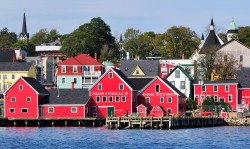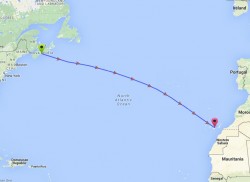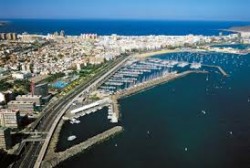Event Dates
October TBC 2016
Every year the VO60 – “Spirit of Adventure” leaves her base in Lunenburg (Nova Scotia) and makes her way across the Atlantic to prepare for either the RORC Transatlantic Race or the ARC Atlantic Rally for Cruisers. Either one will take her over to the Caribbean for the many regattas that region offers.
Lunenburg
Lunenburg was begun as an agricultural settlement, taking advantage of one of the few pockets of good soil along Nova Scotia’s South Shore. However in the 19th century the town evolved as a major centre for the offshore banks fishery, building and manning fishing schooners to exploit the Grand Banks of Newfoundland and the fishing banks off Nova Scotia. The town helped sponsor the construction of the Nova Scotia Central Railway in 1889, which became the Halifax and Southwestern Railway and helped further develop fishing exports and allied industries such as the Lunenburg Foundry.
While wooden shipbuilding lapsed in other parts of Nova Scotia with the arrival of steamships, Lunenburg yards specialized in fishing schooners which remained competitive until the 1920s. The most famous was Bluenose built in 1921, a schooner which brought in record catches and won the International Fishermen’s Trophy.
Relying heavily on Newfoundland migrant labour, Lunenburg made the transition from fishing schooners to trawlers and continued as a major fishing centre after WW II. Success in building wooden trawlers preserved many skills and technology from the sailing era which led the town to become a leader in building large sailing ship replicas, beginning with the film ship Bounty in 1960 and continuing with Bluenose II in 1963 and HMS Rose in 1970.
The Route
Gran Canaria
Las Palmas is the largest city of the European Union lying outside the European Continent, with a population of nearly 400,000. It is located in the northeast part of the Spanish island of Gran Canaria, about 150 kilometres (93 miles) off the northwestern coast of Africa within the Atlantic Ocean.
Las Palmas enjoys a subtropical climate, with mild to warm temperatures throughout the year, according to a leading climatologist the ‘best climate in the world’!
It was founded as a city in 1478, considered the de facto only capital of the Canary Islands until the seventeenth century. Today, the city is capital of Canary Islands, shared in a 4-year term with Santa Cruz de Tenerife. It is the judicial and commercial capital of the Canary Islands, and is also home to a great share of the executive power.









